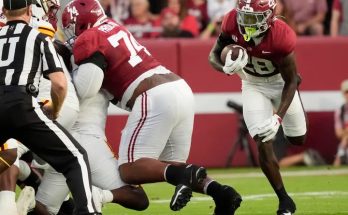JJ McCarthy’s journey from hitting the lowest points of his life to stepping confidently onto the NFL stage as the starting quarterback for the Minnesota Vikings is a story that transcends football. Behind the highlights, the stats, and the fanfare of professional sports, there is a human story of struggle, resilience, and personal growth that often goes unnoticed. McCarthy recently opened up about his battle with depression, a revelation that sheds light not just on the pressures faced by elite athletes, but also on the universal challenges of mental health and the transformative power of self-awareness and mindful practice. In an era where mental health conversations are increasingly vital, McCarthy’s candidness resonates far beyond the stadium lights, offering a blueprint for overcoming personal struggles while pursuing excellence.
For many athletes, success is often measured in touchdowns, wins, and career milestones, yet these external markers can mask profound internal battles. McCarthy, who has become a household name in football circles, revealed that there were times when he felt overwhelmed, isolated, and caught in a cycle of negative thoughts. “There were moments where I didn’t see a way forward,” he admitted. The pressure of performing at the highest level, combined with the expectations of family, fans, and self-imposed standards, created a weight that became increasingly difficult to bear. These feelings were not unique to him; they are reflective of a broader reality where individuals, regardless of status or achievement, confront periods of mental struggle that can feel insurmountable.
What makes McCarthy’s story particularly compelling is not merely the acknowledgment of these struggles, but his proactive approach to addressing them. He didn’t let the lows define him or dictate his future. Instead, he sought ways to regain control, to reset his mindset, and to cultivate a sustainable path to mental and emotional well-being. Meditation and breathing practices became pivotal tools in this journey, helping him develop a sense of presence, clarity, and resilience. These techniques, often overlooked in the high-octane world of professional sports, allowed McCarthy to anchor himself amidst the chaos of both personal and professional life. By committing to these practices consistently, he began to see tangible shifts in his outlook, from heightened focus on the field to a calmer, more balanced perspective off it.
Meditation, as McCarthy described, was not a quick fix but a disciplined practice that required patience and persistence. At first, sitting quietly with his thoughts and emotions felt uncomfortable, even intimidating. The mind’s natural tendency to ruminate on past failures or future anxieties made the process challenging. However, by embracing the discomfort and consistently dedicating time to meditation, he noticed subtle yet profound changes. The racing thoughts that once consumed him became more manageable, and he developed a capacity to observe his emotions without being overwhelmed by them. This shift in perception had a cascading effect, influencing how he interacted with teammates, approached games, and engaged with the world around him.
Complementing meditation, breathing techniques provided McCarthy with practical tools to regulate stress and maintain composure, particularly in high-pressure situations on the field. Controlled breathing exercises, which might seem simple at first glance, offered immediate physiological and psychological benefits. By consciously focusing on his breath, he could slow his heart rate, reduce anxiety, and cultivate a sense of calm that translated into better decision-making during games. Over time, these practices became integral to his preparation and performance, allowing him to navigate the intense demands of being an NFL quarterback without succumbing to the mental and emotional strain that so often accompanies elite competition.
The impact of these practices extends beyond football, touching every facet of McCarthy’s life. He has spoken about a newfound appreciation for balance, self-compassion, and the importance of mental health as a foundational element for success. While victories on the field remain significant, they are no longer the sole measure of his fulfillment. Instead, his perspective has broadened to value resilience, personal growth, and emotional well-being, recognizing that true strength lies not only in physical prowess but in the ability to face and overcome internal challenges. This holistic approach to life, cultivated through mindfulness, meditation, and self-reflection, reflects a maturity that will serve him well both on and off the field.
McCarthy’s openness about his journey also highlights the importance of breaking stigma surrounding mental health, particularly in sports. Historically, athletes have often been expected to embody an image of toughness and invulnerability, leaving little room for vulnerability or discussion of emotional struggles. By speaking candidly about depression and his path to recovery, McCarthy challenges this narrative, encouraging others—both within the sports world and beyond—to acknowledge their struggles and seek support without shame. His story underscores the reality that mental health challenges do not discriminate, and that seeking help is a sign of strength rather than weakness.
In sharing his experiences, McCarthy also emphasizes the role of support systems in recovery and personal growth. While meditation and breathing exercises provided him with essential tools, the encouragement and understanding of family, friends, coaches, and mentors created an environment where he could safely confront his struggles and work toward healing. This network of support is critical, offering perspective, accountability, and reassurance that one is not alone in facing life’s challenges. McCarthy’s acknowledgment of these influences underscores the collective nature of resilience, reminding us that personal triumphs are often intertwined with the guidance and care of others.
Stepping onto the field now as QB1 of the Minnesota Vikings, McCarthy embodies the tangible results of his mental and emotional work. His confidence, poise, and ability to perform under pressure are direct reflections of the mindset he has cultivated. Observers may note his athletic skill and strategic acumen, but it is the integration of mental resilience that truly sets him apart. By confronting and managing his depression, he has unlocked a level of performance and personal fulfillment that might have remained elusive otherwise. This transformation illustrates the profound connection between mental health and professional success, offering a model for athletes and individuals in all walks of life.
McCarthy’s journey also speaks to the broader cultural shift in sports toward valuing mental health as much as physical ability. As more athletes like McCarthy share their experiences, the conversation around mental wellness in competitive environments grows richer and more normalized. Young athletes, fans, and the public gain insight into the fact that mental health is not separate from performance; it is foundational. Programs, practices, and conversations that prioritize mindfulness, emotional regulation, and self-care become increasingly vital, and McCarthy’s story contributes meaningfully to this evolving dialogue.
Furthermore, the narrative of overcoming depression and embracing mindfulness carries lessons that extend well beyond sports. It highlights the importance of self-awareness, the courage to confront uncomfortable truths, and the commitment to consistent, intentional practices that foster growth. McCarthy’s experience demonstrates that while setbacks and low points are inevitable in life, they do not define one’s trajectory. With the right strategies, support, and mindset, individuals can navigate these challenges, emerge stronger, and approach life with renewed purpose and resilience.
For fans, teammates, and aspiring athletes, McCarthy’s story serves as both inspiration and education. It reminds us that behind every public persona is a human being grappling with fears, insecurities, and moments of doubt. It encourages empathy, understanding, and the recognition that personal well-being is integral to achieving long-term success. By openly discussing his journey, McCarthy contributes to a more compassionate, informed, and holistic perspective on what it means to be an athlete and, more broadly, a human being navigating the complexities of life.
In conclusion, JJ McCarthy’s openness about his battle with depression and his commitment to practices like meditation and mindful breathing reveal a side of professional sports that is often overshadowed by statistics and accolades. His story illustrates the profound impact of addressing mental health proactively, demonstrating that resilience, focus, and performance are deeply connected to one’s emotional and psychological well-being. As the starting quarterback for the Minnesota Vikings, McCarthy’s on-field accomplishments are remarkable, but it is his journey of personal growth, self-awareness, and mental fortitude that stands as a truly inspiring testament. By confronting his lowest points and embracing strategies that foster balance and clarity, he offers a powerful example to others facing their own struggles: that healing is possible, that strength comes in many forms, and that life—both on and off the field—is richer and more meaningful when approached with mindfulness, compassion, and courage. His story is bigger than football; it is about the human capacity to overcome adversity, reset one’s mindset, and step into life with renewed purpose and authenticity.



